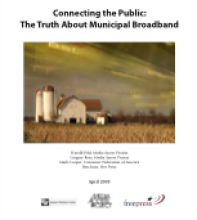
Fast, affordable Internet access for all.

The key metric for broadband should be the applications and needs that drive consumer requirements and choices. In this way, broadband should be understood as a connection that is sufficient in speed and capacity such that it does not limit a user’s required application.Their magic broadband number is a reasonable and doable 10Mbps symmetric connection for residential and small businesses as well as a 1Gbps level for enterprise users. Importantly, they note that a single broadband connection supports far more than a single computer or use - these connections are shared, often among many wired and wireless devices. Compare these comments to those of the NCTA [pdf] (lobbying organization for cable companies) that argue broadband is nothing more than an "always on" connection regardless of the speeds or user experience. This is how they justify maintaining the international laughingstock definition of 768kbps/200kbps.
There are so many interesting articles recently (some are actually a bit older than recent, I guess).
Following up on yesterday's call on the FCC to stop ignoring muni broadband, Karl Bode observes:
Interestingly, of the 51 "constituents" brought in for the 8 most recent workshops, just five don't work for a corporation -- and zero of them act as witnesses for consumer interests (so clearly, you've got your work cut out for you).
And finally, Timothy Karr at Free Press has been unmasking astroturf groups funded by major carriers. Learn more with this fun widget (available here).

The American Recovery and Reinvestment Act of 2009 directed the Federal Communications Commission (FCC) to develop a national broadband strategy. FCC invited comments and then invited replies to those comments in summer 2009. The Free Press Reply Comments deserve to be singled out for revealing some of the lies of large telecommunications companies like Verizon, AT&T, Comcast, Qwest, and others. It also describes many of the ways that these companies harm the communities that are dependent on them for essential services. I've highlighted some passages below that show the ways in which these companies put profit above all else. These companies claim that regulation discourages investment and deregulation (allowing a higher degree of concentration or larger monopolies) encourages increased investment in better networks - an incredibly self-serving claim that Free Press shows to be false on pages 13-29.
Competition -- meaningful and real competition -- and not regulation is the primary driver behind investment decisions. Where meaningful competition exists, incumbents are compelled to innovate and invest in order to maintain marketshare and future growth. Where competition is lacking -- such as it is in our broadband duopoly -- incumbents will delay investment, knowing full well they can pad their profits on the backs of captured customers who have no viable alternatives. (Page 14)
Regulations like open access and non-discrimination encourage competition and should be strengthened. Free Press offers an in-depth explanation of how Verizon has dumped millions of customers on other companies that clearly could not handle the burden.
Verizon began the purging of less lucrative areas with the sale of Verizon Hawaii to the Carlyle Group in 2005, a company that had no previous experience in operating telecommunications services. By Dec. 2008, the company, now called Hawaii Telecom, had lost 21% of customers and filed for bankruptcy. (Page 26)
Verizon then sold most of their New England lines to Fairpoint, which is currently heading for bankruptcy. Fairpoint's customers are not the only ones suffering - the independent companies that resell services over that infrastructure are also suffering because Fairpoint is utterly unable to meet its obligations.
